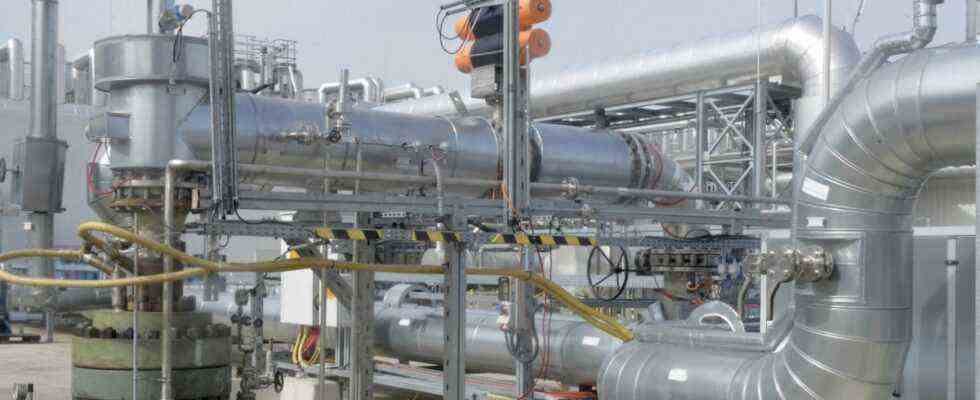The joy at the inclusion of deep heat in the coalition agreement of the new federal government had hardly subsided when the cold shower followed. Geothermal energy operators are convinced that the almost inevitable classification of nuclear energy and natural gas as a sustainable form of energy by the EU will set the industry back a long way. The long-time chairman of the Federal Association of Geothermal Energy, Erwin Knapek, speaks openly of a “cheating”, the managing director of the Pullacher Geothermiegesellschaft, Helmut Mangold, fears that the taxonomy will slow down the joint plans of his IEP with the Munich municipal utility (SWM) to expand the geothermal plants in the south of Pullach. There is an alarm mood in the district of Munich, where alone 13 of the current 42 geothermal plants in Germany are located.
“This impertinence of the international oil and gas industry to sell mankind all new infrastructure for natural gas as hydrogen-ready is almost unbearable. They know very well that they are lying and that politicians who are not technically savvy are falling for something like that” – the anger about the success of the gas and nuclear lobby is clearly visible to Erwin Knapek. Since 2013, electrolysis has been attacked as completely inefficient and made more expensive by taxes on the electrolysis electricity, “and then this oil and gas industry discovers that by pointing out the best of tomorrow, the bad of yesterday should be continued”. Hydrogen is a niche for very selected processes such as steel production or long-distance mobility, but not for power plants that are intended to generate electricity. “Here you can only say: We can all fool ourselves, we don’t need the oil and gas industry for that.”
The former mayor of Unterhaching, Erwin Knapek, was chairman of the Federal Geothermal Association until 2021.
(Photo: Claus Schunk)
The dear money that is at stake needs strict, uniform rules. This should provide the taxonomy instead of enabling greenwashing, says Helmut Mangold from Pullach and explains the effects on the geothermal business, which the layman cannot see at first glance. Almost all large corporations, funds and many consumers themselves demanded that their funds be invested according to so-called corporate social responsibility guidelines. And this is where the EU taxonomy comes into play: billions of euros in insurance premiums, pension plans and other liquidity have to be reinvested every day in Europe.
“With this policy, Europe will become a bad bank of antiquated and proven harmful technologies”
If French nuclear power plants and German gas-fired power plants do not fall into the EU sustainability category, large investors should not invest in such companies. The expansion of such companies would be much more expensive or even stopped. However, because the expansion of renewable energy has been “snored” over the past 15 years, according to Mangold, politicians are in a quandary. Therefore, in turn, she puts a green cloak on gas and nuclear so that these plants can be financed cheaply in France and Germany. “With this policy, Europe is becoming a bad bank of antiquated and proven harmful technologies and is sleeping through future technologies,” criticizes the managing director of the Pullach geothermal company.
Specifically, he is worried that, because of the subsidized natural gas competition, the investment in the expansion of geothermal energy in the south of Pullach is no longer profitable for Stadtwerke München and that the joint venture could be delayed for years if the federal government does not start programs for “real” counteract the heat transition. It’s about a lot of money. SWM and IEP want to build the largest geothermal plant in Germany by 2026 and expect investments of up to 150 million euros.
Stadtwerke München already operate three geothermal plants in the district of Munich, in Kirchstockach, Dürrnhaar and Sauerlach, and are also in the middle of negotiations with the municipality of Grünwald, which owns a large claim, about a feat similar to that in Pullach. Andreas Lederle, the managing director of Erdwärme Grünwald GmbH, said he shook his head when he heard about the EU plans. In his opinion, however, the taxonomy has no effect on the development of his community’s cooperation with the SWM. “Our talks are going well,” he reports.
Thomas Stockerl, the head of the municipal project company Geothermie Unterschleißheim (GTU), reacts relatively calmly to the EU projects. He also thinks it is a completely wrong signal that doesn’t fit into the landscape. However, he does not fear negative effects for the future of urban geothermal energy. The demand for district heating is increasing. “We can’t even supply all the buildings, we don’t have that much geothermal energy,” says Stockerl.
From his point of view, the fact that gas-fired power plants should be classified as sustainable under certain circumstances is questionable, even under the strict criteria known to date, says Willie Stiehler, Managing Director of the Ebersberg-Munich Energy Agency. The push by the EU thwarts the German phase-out of nuclear power, which as a trend-setting, sensible decision should not be reversed. Nuclear power is only a cheap energy source as long as the costs for final storage are not taken into account. “We are already paying for the follow-up costs of lignite and hard coal mining, which are also known as perpetual costs for good reason. That should be a lesson for us much more often,” says Stiehler.

